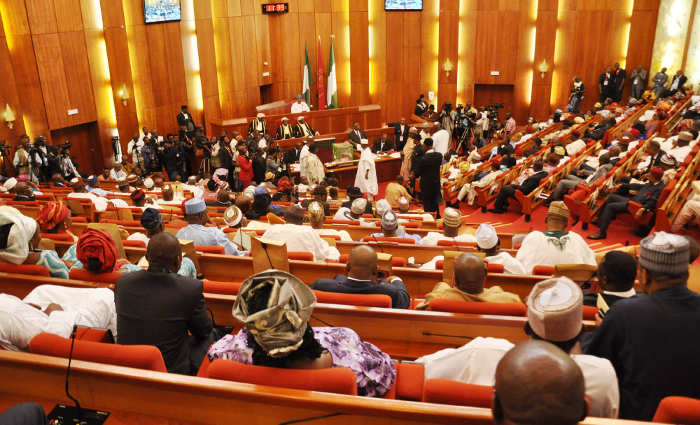The Senate on Thursday okayed electoral voting for Nigerian elections, after it passed amendments to the Electoral Act 2010.
The lawmakers also approved that election results should be electronically transmitted to collation centers.
The Senate took a critical look at some of the challenges that face the country’s electoral system, which cropped up in the recent elections.
The bill came off the report of the Senate Committee on the Independent National Electoral Commission (INEC) on a Bill for an Act to amend the Electoral Act No. 6, 2010 and for other related matters (SB 231 and SB 234).
This new bill provides for the use of electronic voting by INEC during future elections, use of Card Reader and also gives INEC power to modify the voting process if there is a challenge.
The Senate also approved a provision to enable INEC transmit the result of elections electronically in an encrypted and secured manner to prevent hacking.
To address the incident that happened in Kogi State, during last gubernatorial election, the amended Electoral Act provides that if a candidate dies before results of elections are declared, the results will not only remain valid but belongs to the political party that lost its candidate.
It also added that in such a scenario, the INEC should suspend the elections for 21 days during which period the affected political party will conduct fresh primaries to choose a new candidate.
The Bill also gives political parties power to adopt direct or indirect primaries in choosing their flag bearers, while qualification of disqualification of candidates for elections will be solely based on the Constitution.
In his comments after the adoption of the report by the Red Chamber, Senate President, Bukola Saraki, thanked his colleagues for a job well done and expressed optimism that the Bill would further improve the nation’s electoral system and also contribute to good governance.
Saraki said: “Distinguished colleagues, let me thank all of you for this job well done. I want to particularly thank the members of the Committee on INEC and particularly the former chairman of the Committee, Abubakar Kyari, Senator Ovie Omo-Agege and all the members of the committee who have worked very hard to ensure the passage of this very important bill which addresses our electoral process and goes on to strengthen our democracy.
“We have touched on new areas which I believe will improve the credibility of our elections and by so doing, definitely improve our democracy and good governance.
“Most importantly, I think, are some of the new sections we have added, in the area of technology, the smart card reader, and particularly the area of collation which has been an area of great concern.
“Collation of results after the polling units and some of the additions we put on the electronic way by which the compilation of results can be done, I think will go a long way to reduce some of the irregularities we have seen before.
“This is a great work you have been able to put together today and I want to commend everybody. I am also happy that we have passed the amendments very early. My concern has always been that if we don’t do it now, it will get more difficult as we get blowed to the 2019 elections.
“We hope that with this Bill that we have passed, very soon, we will sit together with the House of Representatives to be able to get the copy to the President for assent.
“I think when signed into law, it will enable INEC to have something to work early enough. I think what we have done today will really put our electoral law among the best that we have and it will go a long way in improving our electoral process,” he said.














